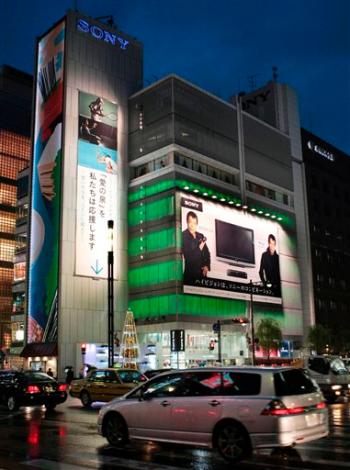
Sony Corp.’s showroom Sony Building is seen in Tokyo’s Ginza shopping district, Tuesday, Dec. 9, 2008. Sony is slashing 8,000 jobs, or 4 percent of its global work force, aiming to cut costs by $1.1 billion a year as a global downturn and stronger yen batters profits at the Japanese electronics maker. Sony Corp., which has 185,000 employees worldwide, said Tuesday it will complete the layoffs by the end of March, 2010. (AP Photo/Itsuo Inouye)
TOKYO (AP) – Sony Corp. is slashing 4 percent of its worldwide work force, reining in spending and shutting plants as it tries to ride out a looming worldwide recession that is battering Japan’s export-reliant manufacturers.
Tokyo-based Sony, which is cutting 8,000 of its 185,000 jobs, said Tuesday it will shut five or six plants – about 10 percent of its 57 factories. Sony also plans to reduce its electronics investments by about one-third by the end of March 2010, although it did not give specific numbers.
The job cuts are the most drastic here since the U.S. credit crunch hit over the summer. They are a bad twist for Sony, which has been recovering from internal problems in recent years under cost-cutting reforms led by Chief Executive Howard Stringer.
“This may mean that Sony is now back at square one,” said Kazuharu Miura, electronics analyst at Daiwa Institute of Research in Tokyo. “Japanese companies are all in trouble because of this unexpected worldwide slowdown.”
Miura also warned that Sony’s measures might not be enough to offset its sliding profits.
Sony’s U.S. shares were up 87 cents, 4.3 percent, at $20.91 in afternoon trading.
Sony said a plant in Dax, France, which makes tapes and other recording media will be among the plants to close, but it declined to list the others. The moves will deliver more than 100 billion yen ($1.1 billion) in savings a year by March 2010, the company said.
“Now we are all facing a recession together,” said Senior Vice President Naofumi Hara. “It is impossible to predict how much longer the situation will last.”
Sony’s announcement comes amid similar news from other Japanese manufacturers, which face plunging demand at home and abroad, as well as falling gadget prices and unfavorable currency fluctuations.
Sony is particularly vulnerable to the strong yen since about 80 percent of its sales come from overseas. The dollar has dropped to about 93 yen from 117 yen last year, eroding with it Sony’s foreign income.
Hara said the ways the job cuts will be carried out will vary by country, but he did not provide a breakdown. Sony’s electronics business employs about 160,000 workers. The company also has movie, video game and financial businesses.
Sony has adjusted production and lowered inventories, but tough times demand more drastic efforts, it contends. The cost-cutting plan includes postponing an investment to boost production of liquid crystal display TVs in Slovakia because of a plunge in European demand for flat-panel TVs.
Sony will also trim spending in semiconductors, and will outsource a portion of the production it had planned for image sensors for mobile phones.
Apart from the 8,000 electronics job losses, Hara said Sony would cut at least 8,000 temporary jobs in the same sector by the end of March 2010. He said temporary workers are not counted in the tally of Sony’s global work force.
Sony usually can count on the year-end holiday shopping season to rake in sales of gadgets such as flat-panel TVs, Blu-ray disc players and game consoles. But consumer sentiments have been dashed by the financial meltdown. Hara said U.S. sales were holding up relatively well, but he acknowledged product prices may have to be cut, especially in Europe, which would diminish profit margins.
Sony recently slashed its full-year earnings projection, citing weaker consumer demand and a stronger yen. For the fiscal year through March 2009, it is expecting a 150 billion yen ($1.5 billion) profit, down 59 percent from the previous year.
Since 2005, Stringer, the first foreigner to lead Sony, has gradually turned the company around, shedding money-losing operations and catching up in flat-panel TVs and portable music players. Hara acknowledged Stringer was sending Sony employees a sad message Tuesday.
“He has told us that the efforts will entail pain. But unless we can get over this, there is no future,” he said. “We are taking a step toward the future.”
By YURI KAGEYAMA
Dec. 09, 2008
Source: AP